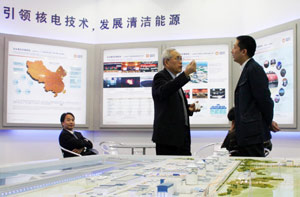CNOOC says oil leaks in Bohai Bay sealed
Updated: 2011-10-25 10:35
By Zhou Yan and Wang Qian (China Daily)
|
|||||||||||
YANTAI, Shandong - China National Offshore Oil Corp (CNOOC), majority owner of the leaking Penglai 19-3 oilfield, said on Monday that the oil leaks have been sealed by reservoir pressure reduction and a series of technological measures.
"After adopting some effective measures, we believe that we have met the requirements set by the State Oceanic Administration (SOA) to thoroughly examine and block the oil sources and continue to clean up the oily mud," said Chen Bi, executive vice-president of CNOOC, the nation's biggest offshore oil producer.
However, the information has yet to be confirmed by the national maritime authority.
A report on the website of the North China Sea Branch of the SOA showed that the daily oil leakage was about 1.67 liters from platform C on Oct 23.
ConocoPhillips China, a subsidiary of the Houston-based energy company ConocoPhillips which has a 49 percent stake in the oilfield in Bohai Bay, said on Monday it is "taking additional measures to monitor the seafloor for activity of previously identified or possible additional seep sources".
Both the SOA and ConocoPhillips could not be reached for immediate comment.
The SOA in early September ordered ConocoPhillips China to halt all operations after the company failed to seal leaks by the Aug 31 deadline set by the maritime authority.
The leaks, which were first observed in June, have spilled about 3,200 barrels of oil and oil-based drilling fluids and contaminated about 5,500 sq km of the bay's surface, official figures showed.
The total seepage has tested below 2 liters daily since Oct 11, and has dropped day by day, Chen said. He added that there is no obvious oil belt seen around Platform C since Oct 9.
Even if the oil leaks have been sealed, it is still difficult to tell whether more leaks will appear when the oilfield resumes operation, according to Ma Jun, director of the Institute of Public and Environmental Affairs.
"Further evaluations on the effectiveness of the sealing measures are required," he said.
"It's a paradox for oil producers in China now," said Zhu Fang, vice-director of the information and marketing department at the China Petroleum and Chemical Industry Federation.
He said that China's surging demand for oil to support its economic expansion requires companies to accelerate their exploration, which will bring about the kind of environmental concerns that have attracted more attention by the public.
"The conflicts will continue," he said.
Related Stories
CNOOC hit by fresh oil leak in northern waters 2011-10-15 10:59
CNOOC sees little need for Q4 spot LNG imports 2011-09-26 15:58
CNOOC says Canada court OKs Opti deal 2011-09-08 09:50
CNOOC shares drop most in a month 2011-09-06 11:05
- CNOOC says oil leaks in Bohai Bay sealed
- Tablet to utilize Alibaba OS
- Japanese factory workers strike over wage dispute
- BYD sets up North American headquarters in LA
- Resource tax will not affect oil price
- China to simplify foreign exchange rules
- Home prices decline in suburban areas
- Pair are jailed for leaking State secrets










